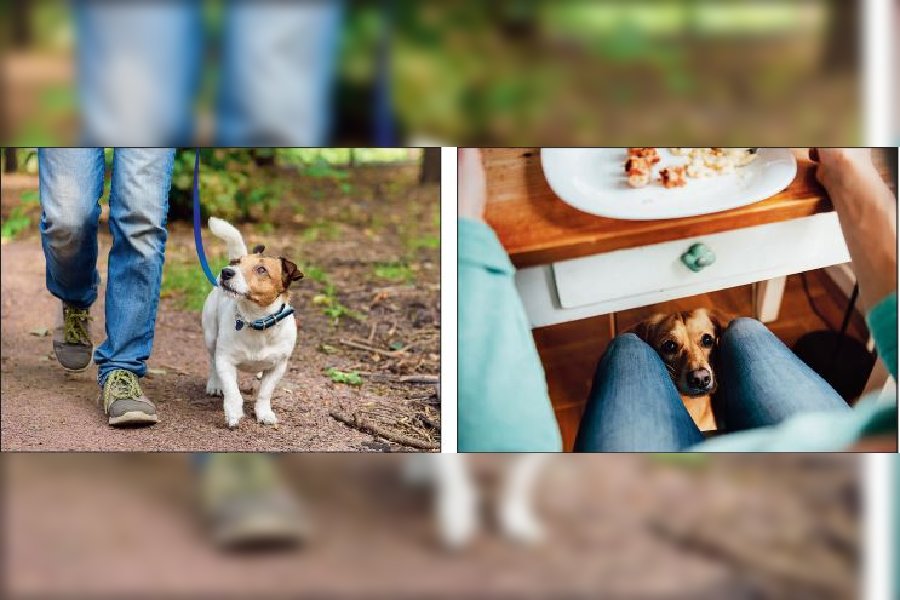AD Block community hall recently held a master class for dog trainers. On the dais was Jay Biswas, who has over 20 years of experience at Tata Motors’- dog squad and who now runs his own centre Burning Eyes K9 in Mumbai and Jamshedpur.
Dogs from all over the country stay at his centres to train for service with the armed forces or for behaviour correction.
The workshop was divided into four days and in participation were trainers, pet crèche owners as well as dog parents. Here’s what The Telegraph Salt Lake learnt from Biswas:
Size doesn’t matter: “Puppy consultancy is an important part of a trainer’s job as potential pet parents ask them which breed to get,” began Biswas.
The most common mistake people make is in blindly assuming that a small dog is right for a small apartment. “More than the dog’s size, it is the breed that matters. So many people come to me complaining that their Beagles are out of control. Well, a Beagle does not belong in a small house!”
Biswas has more than 10 Belgian Malinois — one of the world’s best working dogs — and he says the only other breed that can match up to their energy is the unassuming Beagle. “That’s how energetic they are but if we restrict them to a tiny space they are bound to get naughty,” he said.
Family members: Also important is the mentality of family members. “I know of a house where six members adore dogs but the grandmother is petrified and disgusted by them. So the dog is chained up all day and has become aggressive,” he said. “Even if not love, no one in the dog’s family should hate them. Otherwise, the dog will have a terrible life.”
Dogs take a liking for level-headed people who aren’t fearful or overly excited. But if faced by people who get scared and excited, even a docile dog will get agitated and react.
Time you can devote: Many took in pet dogs and cats during the pandemic but by mid-2022, Biswas said 60 per cent of them were abandoned or sent to shelters. “Once schools and offices called people back, no one had time for the dogs anymore. If you cannot devote 30 minutes a day to your dog, don’t get one.”
Pick of the litter: Another common mistake parents make is choosing the most active dog in the litter. “His activity seems cute when he’s a pup but will you be able to handle it when he’s older?” asked Biswas. “In a litter, the pups with high drive are meant to be working dogs to be used in the army, police, narcotics department etc. The medium-drive dogs are meant for competitions and the lowdrive dogs make the best companions.”
Socialising: Puppies must be allowed to socialise with different kinds of people, animals and environments. “Some parents think that if their dog becomes friendly, he will not guard their homes from strangers. This is not true. A dog that is not comfortable with new people is cowardly and lacks confidence. Can such a dog guard your house?” he asked.
Most dogs have a natural guarding tendency that kicks in once his mind and physique have developed. Thereafter he will protect his territory and pack members.
Bad habits: The job of the trainer is to teach the dog right behaviour and to correct unwanted behaviour but the pet parent must ensure the dog does not develop wrong behaviour in the first place.
“For instance, never give the dog food from your plate.”
Competitive spirit: Many pet parents dismiss the obedience rounds in dog shows as unnecessary for companion dogs but every aspect of these competition is designed keeping pet dogs in mind.
“One round at these events is the ‘loose leash walk’. Isn’t this what all parents want? To be able to walk in the park with the pets by their side?” Biswas asked. “‘Recall’ is another task. This means having the dog run to you when you call out his name. So many parents complain that their dog doesn’t turn back in case he slips out of their leash.”
Yet another event has strangers petting the dog and the dog remaining calm. “These are all essential qualities for pet dogs and trainers need to encourage parents to try them.”
Be professional: The workshop gave out tips on how trainers can improve their business. “The most common complaint against trainers is absenteeism. They must be regular and honest. Many take an advance from parents and vanish. I myself began my career as a dog walker in 2000 and can say that professionalism goes a long way,” he said.
Biswas also had advice for those starting pet creches. “Beginners mustn’t take in aggressive dogs as a bite will only dent their confidence. And insist that parents bring the pet over a few times to get familiar with you before suddenly dumping them at your crèche one fine day and disappearing for a fortnight. The dog will be more comfortable.”
